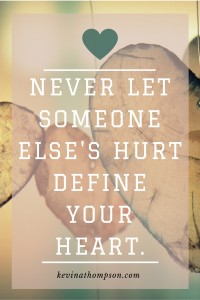Love motivates us to say hard things.
Hurt drives us to say harsh things.
There is a difference. (See: Use Hard Words, Not Harsh Words)
When I was in college, I did an internship. It was one of the most meaningful learning experiences in my formal education. For a month, I worked as a chaplain at a large hospital near my college town. In a short period of time, I experienced a lot of life. Within moments of starting my first day, I saw my first dead body and heard the screams of daughters finding out their daddy was gone. During that month I watched a couple of people die, interacted with patients in hospice, and engaged with several families during the worst days of their lives. It was a great preparation for a life in the helping profession.
At the end of the month, the class required an exit interview with my supervisor. During the conversation, he said some very hard things to me. They were words I needed to hear, areas where I could improve, and blind spots I has missed. He showed courage and love in telling me what I needed to hear.
But the conversation didn’t end there. He continued to say some very harsh things to me. He took the hard facts and drew some harsh conclusions. They were conclusions which weren’t his to make. Instead of viewing my faults as one aspect of who I was, he used them to define my whole heart by those failures.
I was crushed. In twenty years of life, I had never had an authority figure speak about me in that way. A week later I was leaving a class and a professor was standing in the hallway waiting on me. He asked if he could walk me to my next class and I agreed. As we walked he mentioned the conversation. Having worked at the hospital and the university, he was privy to information others didn’t know. Not only was he aware of the conversation my supervisor had with me, he also knew some private things about the supervisor. (See: No Words Are Perfect)
He told me to learn whatever I wanted from the conversation, but not to take it too seriously. He told me a bit of the supervisor’s story and said that much of what he said to me had little to do with me. He was speaking far more from his hurt than about my heart. He might have been right about the single issue, but he was wrong for trying to define my whole life because of one place in need of growth.
From that conversation, I’ve been reminded:
Never let someone else’s hurt define your heart.
The principles of recovery teach us that “hurt people hurt people.” Sometimes intentionally, often unintentionally, they take the pain in their lives and transfer it to others. The problem is that we often let them.
In my case, a wise supervisor said some important things to me, but instead of stopping there, he allowed the pain in his life to color his thinking about me. His hard words became harsh words and they did a great deal of damage. Thankfully, a compassionate professor took the time to find me, wait on me, and walk me to my next class in order to make sure I didn’t take those words to heart.
If we aren’t careful, we can be defined by the hurt of others. We can allow their pain to define our hearts.
An alcoholic falls off the wagon and after a night of drinking comes home and yells at his kids. The kids assume they have done something wrong.
An out-of-touch boss is unable to clearly communicate expectations for his team, so some of his employees begin to think they are failures.
A coach is uncertain about a game plan so he continually yells and screams at his players. Some of the players allow the yelling to define their inability instead of seeing it as the coach’s failure.
Not every negative word says more about the speaker than the hearer. Sometimes people are speaking their opinion. However, in many occasions harsh words have little to do with us. People are in pain and from their pain, they speak. While we can always try to learn from what they say, we should be careful about allowing their words to define us.
Other people can define my actions, but it’s not their calling to define my heart–that is between me and God. (See: A Father’s Primary Role)
Sadly, we often allow the hurt of others to define us. We enmesh our lives with theirs in unhealthy ways and hurt because of it. We should be quick to help others, but we should never allow the pain of others to define us.
- Your children’s success or failure does not define your heart.
- Your spouse’s actions do not define who you are.
- Your boss or supervisor can describe your actions but not define character.
Their hurt doesn’t define your heart.





5 Responses to Don’t Let Them Define You